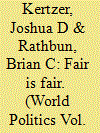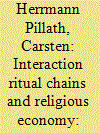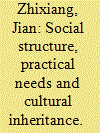| Srl | Item |
| 1 |
ID:
141815


|
|
|
|
|
| Summary/Abstract |
Behavioral economics has shown that people often diverge from classical assumptions about self-interested behavior: they have social preferences and are concerned about issues of fairness and reciprocity. Social psychologists show that these preferences vary across actors, with some displaying more prosocial value orientations than others. Integrating a laboratory bargaining experiment with original archival research on Anglo-French and Franco-German diplomacy during the interwar period, the authors show how fairness and reciprocity matter in social interactions. That prosocials do not exploit their bargaining leverage to the degree that proselfs do helps explain why some pairs of actors are better able to avoid bargaining failure than others. In the face of consistent egoism on the part of negotiating partners, however, prosocials engage in negative reciprocity and adopt the same behaviors as proselfs.
|
|
|
|
|
|
|
|
|
|
|
|
|
|
|
|
| 2 |
ID:
190120


|
|
|
|
|
| Summary/Abstract |
This paper explores the theory of ‘interaction ritual chains’ proposed by the sociologist Randall Collins in understanding popular religion in China today. It contributes to ongoing conceptual debates over approaching Chinese religions and draws conclusions for general socio-economic theory. We concentrate on the specific phenomenon of the resurgence of ancestor worship and lineage rituals which we have explored in fieldwork done in Shenzhen metropolis. We study two empirical cases, the re-emergence of ritual spaces that project the ritual infrastructure of the traditional village onto the modern urban infrastructure, and the role of the internet in mediating ritual activities between the local and the global.
|
|
|
|
|
|
|
|
|
|
|
|
|
|
|
|
| 3 |
ID:
142860


|
|
|
|
|
| Summary/Abstract |
Cultural traditions influence historical processes in the form of structural norms, as well as the ideologies, behavioural types and judgement standards of social actors. This article studies how people react and what social results have emerged from their interactions in a rapidly changing society based on the case of Osman Batur in the Kazakh society in Xinjiang, China, in the 1940s. Although Osman passed away 60 years ago, his influence lives on and the debate on this historical figure continues: whether “East Turkistan Republic” in the 1940s was a separatist rebellion or revolutionary movement, and whether Osman was a national hero who defended China’s unity or a counter-revolutionary bandit. This debate will continue under new conditions and influence ethnic relations in the 21st century.
|
|
|
|
|
|
|
|
|
|
|
|
|
|
|
|
| 4 |
ID:
096669


|
|
|
|
|
| Publication |
2010.
|
| Summary/Abstract |
This article is based on an analysis of 19 in-depth qualitative interviews conducted in four regions of the Russian Federation between 2002 and 2004. Issues related to reliance on the body in human interactions outside the sphere of intimate relationships are explored. It is argued that the lack of adequate means of co-ordination in politics and in professional activities induce references to the body in unsuitable contexts and formats of interaction. Links between the body and two other co-ordination devices, convention and power, are explored. Two cases, namely sexual harassment and machismo, are considered in greater detail.
|
|
|
|
|
|
|
|
|
|
|
|
|
|
|
|